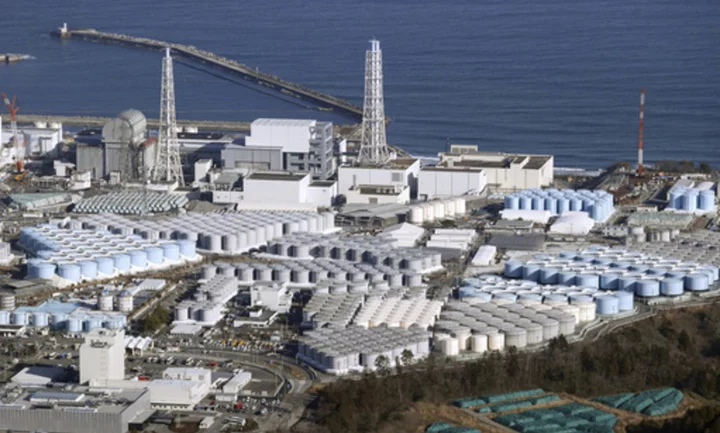TOKYO (AP) — Japanese government officials sought understanding from fisheries groups Monday for the impending release of treated radioactive wastewater from the wrecked Fukushima nuclear plant into the sea and pledged to support their livelihoods throughout the process that will take decades.
Economy and Industry Minister Yasutoshi Nishimura met with the head of the National Federation of Fisheries Cooperatives and promised that the government is doing everything it can to ensure the safety of the release and prepared measures to protect the fisheries industry's reputation.
Nishimura told the fisheries official, Masanobu Sakamoto, that the water release is essential for the plant decommissioning and Fukushima's recovery and can't be postponed. He also said the government will stand by the concerns and needs of the fisheries community until the release ends decades later.
Sakamoto, at the outset, stressed that his organization as a whole remains opposed to the release, but he said members of the fishing community have gained some confidence about the safety following recognition by the International Atomic Energy Agency report and explanations by government officials in recent weeks, signaling easing of their position.
Their meeting paves the way for Prime Minister Fumio Kishida’s planned meeting later Monday with Sakamoto, a crucial step in which Kishida is to convey his government's commitment to carry out the release safely and to support the livelihoods of the fishing communities.
The government announced the release plan two years ago and has since faced strong opposition from Japanese fishing organizations, which worry about further damage to the reputation of their seafood as they struggle to recover from the 2011 earthquake, tsunami and nuclear disaster. Groups in South Korea and China have also raised concerns, turning it into a political and diplomatic issue.
The date when the water release will start is expected to be decided at a meeting of key Cabinet ministers as early as Tuesday. It is widely expected to start at the end of August.
The government and TEPCO say the water must be removed to make room for the plant's decommissioning and to prevent accidental leaks from the tanks because much of the water is still contaminated and needs further treatment.
Japan has obtained support from the IAEA to improve transparency and credibility and to ensure the plan by TEPCO meets international safety standards. The government has also stepped up a campaign promoting the plan’s safety at home and through diplomatic channels.
The IAEA, in a final report in July, concluded that the TEPCO plan, if conducted strictly as designed, will cause negligible impact on the environment and human health, encouraging Japan to proceed.
While seeking understanding from the fishing community, the government has also worked to explain the plan to neighboring countries, especially South Korea, to keep the issue from interfering with their relationship.
A massive March 11, 2011, earthquake and tsunami destroyed the Fukushima Daiichi plant’s cooling systems, causing three reactors to melt and contaminating their cooling water. The water is collected, filtered and stored in around 1,000 tanks, which will reach their capacity in early 2024.
The water is being treated with what’s called an Advanced Liquid Processing System, which can reduce the amounts of more than 60 selected radionuclides to government-set releasable levels, except for tritium, which the government and TEPCO say is safe for humans if consumed in small amounts.
Scientists generally agree that the environmental impact of the treated wastewater would be negligible, but some call for more attention to dozens of low-dose radionuclides that remain in it.

